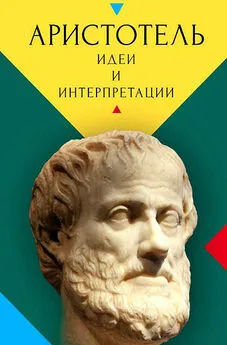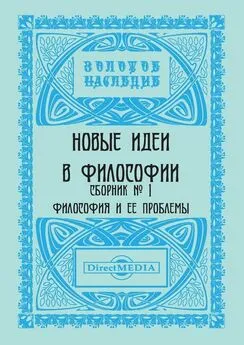Коллектив авторов - Аристотель. Идеи и интерпретации
- Название:Аристотель. Идеи и интерпретации
- Автор:
- Жанр:
- Издательство:Аквилон
- Год:2017
- Город:Москва
- ISBN:978-5-906578-31-0
- Рейтинг:
- Избранное:Добавить в избранное
-
Отзывы:
-
Ваша оценка:
Коллектив авторов - Аристотель. Идеи и интерпретации краткое содержание
Издание подготовлено при поддержке Российского научного фонда (РНФ), в рамках Проекта (№ 15-18-30005) «Наследие Аристотеля как конституирующий элемент европейской рациональности в исторической перспективе».
Рецензенты:
Член-корреспондент РАН, доктор исторических наук Репина Л.П.
Доктор философских наук Мамчур Е.А.
Под общей редакцией М.С. Петровой.
Аристотель. Идеи и интерпретации - читать онлайн бесплатно полную версию (весь текст целиком)
Интервал:
Закладка:
Alexandri Aphrodisiensis De anima libri mantissa (= De anima liber alter) / Ed. I. Bruns // Alexandri Aphrodisiensis praeter commentaria scripta minora (Commentaria in Aristotelem Graeca, suppl. 2.1). Berlin: Reimer, 1887. S. 101–186.
Alexander of Aphrodisias. Quaestiones 1.1–2. 15 / Transl. by R.W. Sharples. London, 1992.
The De anima of Alexander of Aphrodisias: a Translation and Commentary by Athanasios P. Fotinis. Washington, D.C.: University Press of America 1979.
Alexander of Aphrodisias. On the Soul. Part 1: Soul as Form of the Body, Parts of the Soul, Nourishment, and Perception / Transl. with an introd. and comm. by V. Caston. London et al.: Bloomsburry, 2012.
Alexander of Aphrodisias. Supplement to «On the Soul» / Transl. by R.W. Sharpies. New York: Cornell University Press, 2004.
Aristoteles. Physica / Transl. by R.P. Hardie and R.K. Gaye // The Works of Aristotle. Transl. into English under the editorship of W.D. Ross. Vol. II: Physica. De Caelo. De Generatione et Corruptione. Oxford: At the Clarendon Press, 1930.
Aristoteles. De Generatione et Corruptione / Transl. by Harold H. Joachim (1922) // The Works of Aristotle. Transl. into English under the editorship of W.D. Ross. Vol. II: Physica. De Caelo. De Generatione et Corruptione. Oxford: At the Clarendon Press, 1930.
Aristote. De la génération et la corruption. Texte établi et traduit par Marwan Rashed. Paris: Les Belles lettres, 2005.
Epiphanius. Band II: Panarion. Haer. 34–64 / Hrsg. von K. Holl. (Die Griechischen Christlichen Schriftsteller 31). Leipzig: Hinrichs, 1922. [Haer. 64, §§ 12–62. S. 42-499].
The Panarion of Epiphanius of Salamis. Books II and III. De Fide / Transl. by Frank Williams. 2nd, revised ed. (Nag Hammadi and Manichaean Studies 79). Leiden, Boston: Brill, 2013.
Fragmenta Epicharmi / Hrsg. von G. Kaibel // Comicorum Graecorum fragmenta. Bd. 1.1 (Poetarum Graecorum fragmenta. Bd. 6.1). Berlin: Weidmann, 1899.
Gregorius Nyssenus. De opificio hominis // Patrologiae cursus completus. Series Graeca / Ed. J.-P. Migne. T. 44: S. Gregorii episcopi Nysseni Opera. T. 1. Paris, 1863. Col. 124–256.
Gregory of Nyssa. On the Making of Man / Transl. with notes by H.A. Wilson // A Select library of Nicene and post-Nicene fathers of the Christian church. Second series. Vol. 5. Gregory of Nyssa: Dogmatic Treatises, etc. New York: Charles Scribner’s Sons, 1917. P. 387–427.
Gregorius Nyssenus. Oratio catechetica magna // The Catechetical Oration of Gregory of Nyssa / Ed. by J.H. Srawley. Cambridge: At the University Press, 1903. P. 1–164.
Gregory of Nyssa. The Great Catechism / Transl. with notes by H.A. Wilson // A Select library of Nicene and post-Nicene fathers of the Christian church.
Second series. Vol. 5. Gregory of Nyssa: Dogmatic Treatises, etc. New York: Charles Scribner’s Sons, 1917. P. 471–509.
Ioannis Philoponi in Aristotelis libros de generatione et corruptione commentaria / Hrsg. von H. Vitelli (CAG 14.2). Berlin: Reimer, 1897. S. 1-314.
Methodius. De resurrectione // Methodius I Hrsg. von N. Bonwetsch (Die Griechischen Christlichen Schriftsteller 27). Leipzig, 1917. S. 217–424.
Nemesius. De natura ho minis // Ed. B. Einarson [Corpus medicorum Graecorum]. Berlin, 1927. S. 35-368.
Origène. Traité des Principes / Ed. par H. Crouzel, M. Simonetti. T. 1–4. SC 252, 253, 268, 269. Paris: Cerf, 1978–1980.
Pamphile et Eusèbe de Césarée. Apologie pour Origène suivi de Rufin d’Aquilée Sur la falsification des livres d’Origène // Texte critique, traduction et notes par René Amacker et Éric Junod. Tome I. SC 464. Paris: Cerf, 2002.
Philoponus. On Aristotle On Coming-to-Be and Perishing 1.1–5 // Transl. by C.J.F. Williams. Introd. by Sylvia Berryman. London: Duckworth, 1999.
Photius. Bibliothèque. T. 5 («Codices» 230–241) I Ed. R. Henry. Paris: Les Belles Lettres, 1967. P. 83–107.
Porphyre. Sentences / Éd. sous la responsabilité de Luc Brisson, avec une traduction anglaise de John Dillon. T. 1–2. Paris: Librairie philosophique J. Vrin, 2005.
Simplicii in Aristotelis categorias commentarium / Hrsg. von K. Kalbfleisch (CAG 8). Berlin: Reimer, 1907. S. 1-438.
Vitruvius. On Architecture / Ed. and transl. by F. Granger. Vol. 1 (The Loeb Classical Library 251). Cambridge, MA: Harvard University Press, 1955.
Ориген. О началах. 1899, переиздано: СПб.: Амфора, 2000.
Григорий Нисский. Об устроении человека // Творения святых Отцов в русском переводе. Т. 37. М.: Типография В. Готье, 1861. c. 17-222.
Мефодий Олимпийский (Патарский). Аглаофон, или О воскресении // Св. Мефодий, епископ и мученик. Полное собрание его творений // Пер. под ред. Е. Ловягина. СПб., 1877 ( 21905). c. 192–256 (из Епифания), с. 256–271 (из Фотия) [репринт: Творения св. Григория Чудотворца и св. Мефодия, епископа и мученика. Библиотека отцов и учителей церкви. М.: Паломник, 1996].
Исследования
Chadwick H. Origen, Celsus, and the Resurrection of the Body // Harvard Theological Review. 1948. № 41. P. 83–102.
Crouzel H. Origen: The Life and Thought of the First Great Theologian / Trans. by A.S. Worrall. London: Harper and Row, 1989. P. 155–157.
Furth M. Transtemporal Stability in Aristotelian Substances // The Journal of Philosophy. 1978. № 75. P. 624–646.
Henessey L.R. A Philosophical Issue in Origen’s Eschatology: The Three Senses of Incorporeality // Origeniana Quinta. Papers of the 5th
International Origen Congress / Ed. R.J. Daly. Leuven: Uitgeverij Peeters, 1992. P. 273–280.
Kupreeva I. Alexander of Aphrodisias on Mixture and Growth // Oxford Studies in Ancient Philosophy. 2004. № 27. P. 297–334.
Lloyd A.C. Aristotle’s Principle of Individuation // Mind. 1972. № 79. Issue 316. P. 519–529.
Petroff V. Theoriae of the Return in John Scottus’ Eschatology // History and Eschatology in John Scottus Eriugena and His Time. Proceedings of the 10th Conference of the SPES, Maynooth and Dublin, August 16–20, 2000 / Eds. James McEvoy and Michael Dunne. Leuven: University Press, 2002. P. 527–579.
Petroff V. Eriugena on the Spiritual Body // American Catholic Philosophical Quarterly. 2005. № 79, 4. P. 597–610.
Rashed M. Introduction // Aristote. De la génération et la corruption. Texte établi et traduit par Marwan Rashed. Paris: Les Belles lettres, 2005. P. xi-clxxxvi.
Todd R.B. Galenic Medical Ideas in the Greek Aristotelian Commentators // Symbolae Osloenses. 1976. Vol. 52 P. 117–34.
Петров В.В. Ориген и Дидим Александрийский о тонком теле души // Диалог со временем 15 (2005), сс. 37–50.
Петров В.В. Учение Оригена о теле воскресения в контексте современной ему интеллектуальной традиции // Космос и душа. Учения о вселенной и человеке в Античности и в Средние века (исследования и переводы) / Общ. ред. П.П. Гайденко и В.В. Петров. М.: ПрогрессТрадиция, 2005. c. 577–632.
Петров В.В. Тело и телесность в эсхатологии Иоанна Скотта // Космос и душа. Учения о вселенной и человеке в Античности и в Средние века (исследования и переводы) / Общ. ред. П.П. Гайденко и В.В. Петров. М.: Прогресс-Традиция, 2005. c. 633–756.
Петров В.В. Аристотель и Александр Афродисийский о росте и растущем // ΣΧΟΛΗ. 2015. № 9 (2). c. 394–402.
Петров В.В. Аристотелевская традиция о текучести и преемственности вечно изменчивых живых тел индивидов // Диалог со временем 2015. № 52. c. 82–92.
Петров В.В. Элементы аристотелевской доктрины о росте и растущем у Оригена, Мефодия Олимпийского и Григория Нисского // ΣΧΟΛΗ. 2016. № 10 (1). c. 117–130.
М.С. Петрова
Рецепция текстов Аристотеля в латинском платонизме поздней античности [508]
В настоящей статье обсуждаются особенности использования текстов Аристотеля латинским платоником Макробием (сер. V в.), а также исследуются вопросы, что именно и как Макробий заимствует у Стагирита, в какой мере он трансформирует полученное знание, насколько точно передает и излагает его, а также было ли Макробиево знание текстов греческого философа прямым или опосредованным [509]. К рассмотрению привлекаются два сочинения Макробия, а именно, «Комментарий на „Сон Сципиона“» и «Сатурналии». Еще одна его работа, озаглавленная «О различиях и сходствах греческого и латинского глаголов», не содержит упоминаний об Аристотеле и параллелей с его текстами. Заметим, Макробий не является оригинальным мыслителем; он лишь адаптирует работы греческих авторов.
Вкратце скажем о том, что собой представляет Макробиев «Комментарий». Собственно, название сочинения говорит само за себя — автор разъясняет заключительный раздел трактата Цицерона «О государстве», озаглавленный «Сон Сципиона». Основными источниками Макробия служат греческие тексты, которые он кратко пересказывает, опуская промежуточные рассуждения и оставляя лишь выводы. По этой причине его текст напоминает свод греческого знания [510], популярно изложенный для латинского читателя. Избранный Макробием метод для составления «Комментария» — тот же, что и у поздних комментаторов-платоников, как греческих, так и латинских (среди которых Ямвлих, Прокл, Калкидий и другие): автор помещает цитату в начало главы и посвящает последнюю ее толкованию. Для манеры его письма (впрочем, как и для всех комментаторов Поздней Античности) характерно желание создать впечатление работы с первоисточниками и продемонстрировать свою эрудицию.
Читать дальшеИнтервал:
Закладка:










